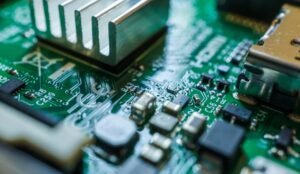Learn AI Now
Artificial Intelligence (AI) has become an increasingly important field in the world of technology and innovation. As AI continues to advance, it is crucial for individuals to learn about its concepts, applications, and potential impact on various industries. Whether you are a student, professional, or simply interested in expanding your knowledge, now is the perfect time to dive into the world of AI.
Key Takeaways
- AI is a rapidly growing field with significant impact on various industries.
- Learning AI can open up new opportunities for personal and professional growth.
- Exploring AI now allows you to stay ahead in an evolving technological landscape.
AI, a branch of computer science, focuses on creating intelligent machines that can perform tasks that typically require human intelligence. It encompasses various subfields such as machine learning, natural language processing, computer vision, and robotics. AI applications are already present in numerous industries, including healthcare, finance, transportation, and entertainment.
Artificial intelligence has the potential to revolutionize the way we live and work. It enables machines to analyze large volumes of data, detect patterns, make predictions, and automate processes. From self-driving cars to personalized recommendations on streaming platforms, AI is all around us. By learning about AI now, you can understand how these technologies work and their potential impact on society.
Getting Started with AI
- Start with the basics: Gain a solid understanding of key AI concepts such as machine learning algorithms, neural networks, and data preprocessing methods.
- Choose a programming language: Python is widely used in AI development due to its simplicity and extensive libraries for AI tasks.
- Take online courses: Platforms like Coursera, edX, and Udemy offer a range of AI courses for different skill levels.
- Explore AI frameworks and tools: Popular frameworks like TensorFlow and PyTorch provide a foundation for building AI applications.
AI in Industries
| Industry | AI Application |
|---|---|
| Healthcare | Medical image analysis for diagnostics |
| Finance | Fraud detection and algorithmic trading |
| Transportation | Autonomous vehicles and route optimization |
The integration of AI in various industries is already bringing significant benefits. In healthcare, AI-powered systems can analyze medical images, assisting doctors in accurate diagnoses. Financial institutions rely on AI algorithms for fraud detection and optimizing trading strategies. Transportation companies are exploring self-driving vehicles and utilizing AI for efficient route planning.
The Future of AI
In the years to come, AI is expected to continue its rapid growth and impact. As more data becomes available and computational power increases, AI algorithms will become even more powerful and reliable. AI applications will expand to fields such as education, agriculture, and cybersecurity, further transforming the way we live and work.
| Potential AI Developments | Impact |
|---|---|
| AI in education | Personalized learning experiences for students |
| AI in agriculture | Precision farming and crop yield optimization |
| AI in cybersecurity | Enhanced threat detection and prevention |
Exciting opportunities lie ahead for those who embrace AI and stay updated with the latest advancements. By continuously learning and adapting, individuals can actively contribute to the AI field and positively shape the future.

Common Misconceptions
1. AI is all about robots and sci-fi
One of the most common misconceptions about artificial intelligence (AI) is that it is limited to robots and the realm of science fiction. While robots are indeed one application of AI, AI is a much broader field that encompasses various technologies and techniques. AI is used in many everyday applications and systems that we interact with, including voice assistants like Siri and Alexa, recommendation algorithms used by streaming services, and even autonomous vehicles.
- AI is not limited to robotics.
- AI is used in various everyday applications.
- Voice assistants and recommendation algorithms are examples of AI.
2. AI will replace humans in all jobs
Another misconception is the belief that AI will completely replace humans in all job roles. While it is true that AI has the potential to automate certain tasks and job functions, it is not expected to replace humans entirely. AI technologies are often designed to augment human capabilities and improve efficiency, rather than replace human workers. Many jobs will require a combination of human and AI involvement, with humans focusing on tasks that require creativity, empathy, and critical thinking.
- AI is not expected to replace humans entirely in all jobs.
- AI can augment human capabilities and improve efficiency.
- Human involvement will still be necessary in many job roles.
3. AI is infallible and free from bias
Contrary to popular belief, AI systems are not infallible or devoid of bias. AI algorithms are built by humans and can inherit biases present in the data they are trained on. If a dataset contains biased information, the AI model will make biased decisions. For example, facial recognition systems can exhibit higher error rates when identifying individuals with darker skin tones due to biases in the datasets used for training. It is crucial to continuously monitor, evaluate, and improve AI systems to ensure fairness and mitigate bias.
- AI systems can inherit biases present in the data they are trained on.
- Facial recognition systems can exhibit biases in identifying individuals with darker skin tones.
- Monitoring and evaluating AI systems is important to mitigate bias.
4. AI will lead to mass unemployment
There is a common fear that AI advancements will result in mass unemployment. While it is true that automation may impact certain job roles, AI also creates new opportunities and job roles. As AI technology evolves, it will change the nature of work rather than eliminate it. For instance, AI can streamline processes, freeing up human workers to focus on more complex and creative tasks. Additionally, AI will create jobs in developing, maintaining, and improving AI systems, as well as jobs in fields that support the AI ecosystem.
- AI will change the nature of work, not eliminate it.
- AI can free up human workers to focus on complex tasks.
- AI will create job opportunities in developing and maintaining AI systems.
5. AI is all-knowing and can solve any problem
While AI has made significant advancements in recent years, it is essential to recognize that AI is not all-knowing and cannot solve every problem. AI systems are designed to solve specific tasks for which they are trained and may struggle when confronted with novel situations or tasks outside their domain. AI relies on the quality and availability of data, and if the data doesn’t accurately represent the problem, the AI model’s effectiveness may be limited. Humans still play a crucial role in shaping AI systems and applying critical thinking to solve complex problems.
- AI is not all-knowing and cannot solve every problem.
- AI may struggle with novel situations or tasks outside its training domain.
- Human involvement is necessary to solve complex problems.

How AI is Transforming Different Industries
Artificial intelligence (AI) is revolutionizing various industries through its ability to analyze vast amounts of data and make intelligent decisions. This article explores ten industries where AI has emerged as a game-changer, providing remarkable advancements and transforming the way we live and work.
Improved Diagnoses in Healthcare
AI technology in healthcare has enabled more accurate and timely diagnoses. Through machine learning algorithms, AI systems can analyze medical images and patient data, assisting doctors in identifying diseases in their early stages and recommending personalized treatment plans.
Efficient Financial Trading
AI-powered algorithms are reshaping financial trading by processing market data and making predictions with lightning speed. These advanced systems have significantly increased the efficiency of trading operations, leading to improved investment strategies and enhanced profitability.
Optimized Supply Chain Management
AI-driven supply chain management systems are streamlining logistics operations. By integrating real-time data from various sources, AI can forecast demand, automate inventory management, and optimize transportation routes, reducing costs and improving efficiency.
Enhanced Customer Service with Chatbots
AI-powered chatbots are revolutionizing customer service by providing instant support to users. These virtual assistants leverage natural language processing to understand customer queries and provide relevant information or solutions, saving time and improving satisfaction.
Intelligent Personal Assistants
Personal assistants like Siri, Alexa, and Google Assistant are AI-powered virtual companions capable of performing tasks based on voice commands. They can send messages, set reminders, make appointments, and answer questions, making our daily lives more convenient and productive.
Efficient Agricultural Practices
Agriculture is benefitting from AI in various ways, including crop monitoring, automated machinery, and predictive analytics. AI can analyze soil conditions, weather patterns, and plant health, enabling farmers to make data-driven decisions that maximize crop yield.
Smart Energy Management
AI systems are optimizing energy consumption and reducing waste in the utilities sector. By analyzing patterns of energy usage, AI can predict peak demand times and adjust supply accordingly, resulting in substantial cost savings and improved sustainability.
Automated Fraud Detection
AI algorithms are assisting in fraud detection by analyzing large volumes of transactional data and identifying suspicious patterns. These systems can quickly flag potential fraudulent activities, protecting individuals and businesses from financial losses.
Personalized Advertising
AI-powered systems can analyze vast amounts of user data to create personalized advertisements tailored to individual preferences. By understanding consumer behavior and preferences, advertisers can deliver more relevant content, resulting in higher conversion rates and improved ROI.
SUMMARY:
Artificial intelligence is transforming various industries, from healthcare and finance to agriculture and energy management. By harnessing the power of AI, businesses can optimize their operations, improve customer experiences, and make data-driven decisions. The potential and impact of AI continue to grow, heralding a future where intelligent technologies play an increasingly vital role in everyday life.
Frequently Asked Questions
What is Artificial Intelligence (AI)?
Artificial Intelligence (AI) refers to the simulation of human intelligence in machines that are programmed to think and learn like humans. AI technology allows machines to perform tasks that would normally require human intelligence, such as speech recognition, decision-making, problem-solving, and visual perception.
How can I learn AI?
To learn AI, you can start by gaining a solid understanding of mathematics, statistics, and computer science. There are also numerous online courses and resources available that provide comprehensive AI education. Additionally, participating in AI competitions, working on AI projects, and staying up-to-date with the latest research advancements will help you enhance your AI knowledge and skills.
What are the applications of AI?
AI has various applications across different industries. Some common applications of AI include autonomous vehicles, virtual assistants, natural language processing, chatbots, recommendation systems, fraud detection, healthcare diagnostics, and financial analysis. AI technology has the potential to revolutionize numerous fields and improve efficiency, accuracy, and automation.
What programming languages are used in AI?
Python is the most commonly used programming language in AI due to its simplicity, flexibility, and extensive AI libraries. Other popular programming languages for AI development include Java, C++, R, and Julia. The choice of programming language may depend on the specific AI task or project requirements.
Is AI a good career choice?
Yes, AI offers exciting career opportunities. As the demand for AI technology continues to grow, the need for skilled AI professionals is also increasing. AI careers can range from data scientists and AI engineers to AI researchers and AI consultants. Pursuing a career in AI can lead to high-paying jobs and opportunities to work on cutting-edge innovations.
What are the ethical concerns surrounding AI?
AI presents several ethical concerns, such as privacy and data security issues, algorithmic bias, loss of jobs due to automation, and the potential for AI to be used in harmful ways. It is important for AI developers and society as a whole to address these concerns and develop ethical frameworks to ensure the responsible and beneficial use of AI technology.
How is AI different from machine learning?
While AI and machine learning are closely related, they are not the same. AI is a broader concept that encompasses the simulation of human intelligence in machines, whereas machine learning is a subset of AI that focuses on enabling machines to learn from data without being explicitly programmed. Machine learning algorithms play a crucial role in building AI systems.
What are some notable AI advancements?
There have been several remarkable advancements in AI. Some notable examples include IBM’s Watson, which is known for its natural language processing and question-answering capabilities, self-driving cars like Tesla’s Autopilot, AlphaGo, a program that defeated world champion Go players, and OpenAI’s GPT-3, a highly advanced language model with incredible text generation capabilities.
What skills are important for AI professionals?
AI professionals should possess a combination of technical and analytical skills. Strong programming skills, knowledge of mathematics and statistics, expertise in machine learning algorithms, data analysis, problem-solving abilities, and critical thinking are essential for a successful career in AI. Additionally, good communication and teamwork skills are beneficial for collaboration in AI projects.
Can AI replace human jobs?
While AI has the potential to automate certain tasks and replace jobs that involve repetitive or manual work, it is unlikely to completely replace human jobs. Instead, it is more likely to augment human capabilities and lead to the creation of new jobs. AI systems work best when combined with human intelligence and expertise to achieve optimal results.




